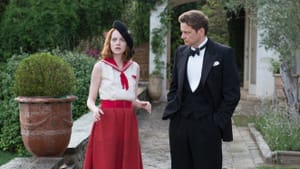Stay in the Loop
BSR publishes on a weekly schedule, with an email newsletter every Wednesday and Thursday morning. There’s no paywall, and subscribing is always free.
When’s the last time you talked to God?
Woody Allen's 'Magic in the Moonlight'

Say what you will about Woody Allen: I think it’s time to lighten up on this much-maligned filmmaker. Cut him some slack and give him a little credit for fortitude. Approaching age 79, he’s still tackling the Big Questions, the same ones that, like the Furies, have pursued him throughout his 50-year career: Does God exist? And if so, why isn’t he nicer to us? Why, in the words of one of his latest characters, is life “short, brutal, and cruel”?
Woody Allen has been obsessed with God and Death for four decades, ever since, well, Love and Death (1975), the ninth of the 49 films in his long, illustrious, and controversial career. Crimes and Misdemeanors (1989) marks his most serious existential investigation into the notion of a godless universe. But in the past decade, as he approaches his 80s and the unknown, he’s turning to phenomenology — or, to put it simply, magic — for answers, as well as for escape, comfort, and comic relief.
Scoop (a 2006 mystery caper), features a character named Splendini, an aging magician (played by Woody himself) who teams up with a young journalism student (Scarlett Johansson) to solve a murder. You Will Meet A Tall Dark Stranger (2010) features a woman (Gemma Jones) who consults a psychic to predict her future. In Midnight in Paris (2011), the Woody Allen character/protagonist (Owen Wilson) journeys back in a magical time machine to the 1920s (where he meets Gertrude Stein, Hemingway, Dalí, Buñuel, and other Paris-based writers and artists), and even farther back into the Belle Époque.
Appearances are deceiving
With Magic in the Moonlight, his newly released film, Allen conjures up a romantic comedy that deals with his darkest fears and still delivers a happy ending. Sumptuously set on the French Riviera in the late 1920s, the story follows Stanley (aka Wei Ling Soo, the stage magician, played by Colin Firth) as he investigates a young American woman named Sophie Baker (Emma Stone) who professes to be a spiritual medium and whom he suspects is a fraud.
While conducting his investigation, Stanley engages in an ongoing dialogue with various other characters in the film about God, death, and the afterlife (the staple leitmotifs of Allen’s filmography). As Woody Allen’s stand-in character, Stanley is a devout atheist. “Why would God go to so much trouble if everything comes to nothing?” he protests. “You’re obsessed with mortality — a perfect depressive,” responds Stanley’s friend Howard (Simon McBurney). “I’m a very unhappy man,” Stanley insists. “To be born, to have committed no crime, and then to be sentenced to death? Happiness is not the natural human condition,” he concludes. And of course, that’s Woody talking.
But wait. Do we see a crack in this filmmaker’s atheistic armor? As Stanley pursues his investigation into Sophie’s occult powers, he finds himself falling in love with her. At first, he resists: “The only supernatural power to show up wears a black robe,” he says, as he observes Sophie conducting a séance. The plot thickens, twists, and turns, and despite the revelation that Sophie is not all that she purports to be, Stanley is nonetheless smitten.
Let’s make a deal
At one point late in the game, we hear Stanley actually bargaining with God, begging Him to save his beloved Aunt Vanessa (Eileen Atkins), who has suffered a motor accident. For those of us who have followed his films all these years, this is a first for Woody. Talking to God? Behind all this posturing, has he become a believer after all?
“We’re just poor limited human beings,” Aunt Vanessa advises, providing a counterpoint to Stanley’s argument. “Life is harsh. One must do what one must do to survive.” Stanley ultimate concedes. “All our suffering will accrue to a greater plan. We are here to serve some higher ideal.”
Can this be the voice of an older, wiser Woody Allen in this richly metaphysical, fanciful, philosophical comedy? Speaking through a number of his characters, he says: “We need our illusions to live. . . . We must, if we are meant to get through life. Each of us must find a reason to truly embrace it.” And that reason, at least in this film, is love.
At the rate that this filmmaker’s philosophy is changing — and so late in the game, too — who knows what the next film will bring? A confession? An apology? Only the next W.A.F.P. (or as they call it in the trade, a “Woody Allen Fall Project”) will tell.
Meanwhile, as Stanley says, “The world may be without purpose, but it may not be without magic.” And that magic for Woody Allen — the magic that gets him through his life — is, of course, “le cinéma.”
What, When, Where
Magic in the Moonlight, written and directed by Woody Allen. Now playing at Ritz Five Cinema, 2nd and Walnut Streets, Philadelphia, www.landmarktheatres.com. Philadelphia area showtimes here.
Sign up for our newsletter
All of the week's new articles, all in one place. Sign up for the free weekly BSR newsletters, and don't miss a conversation.
